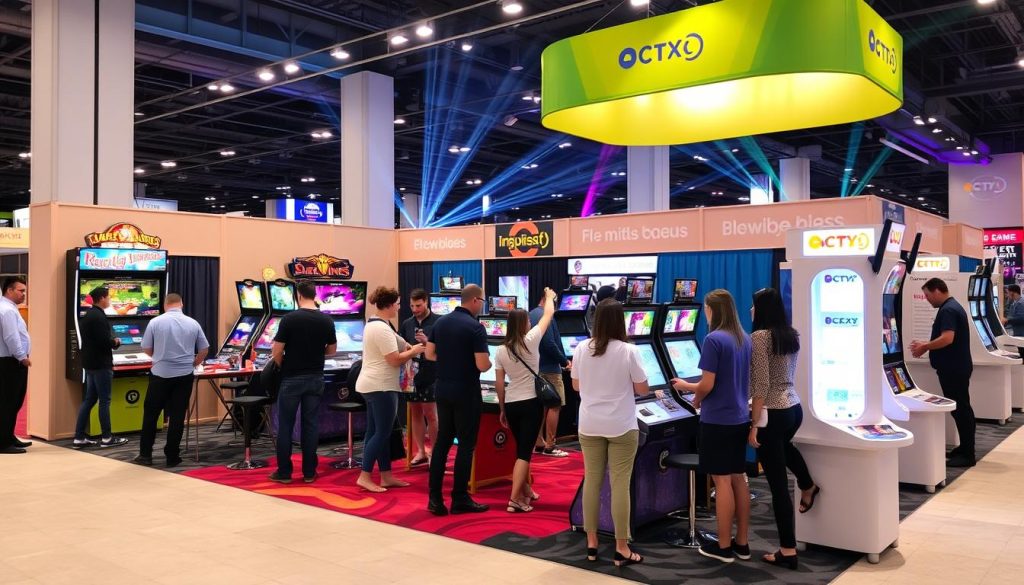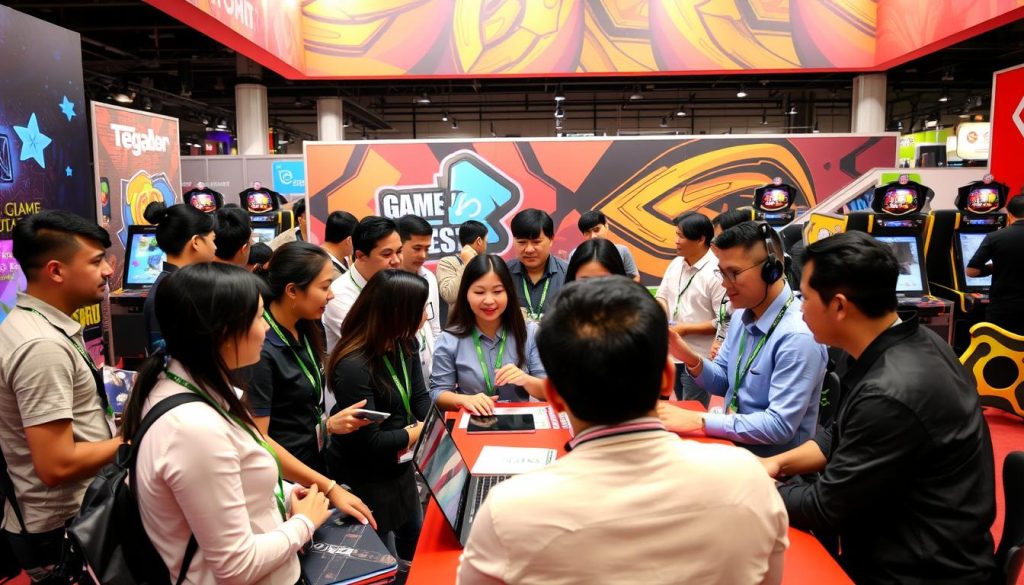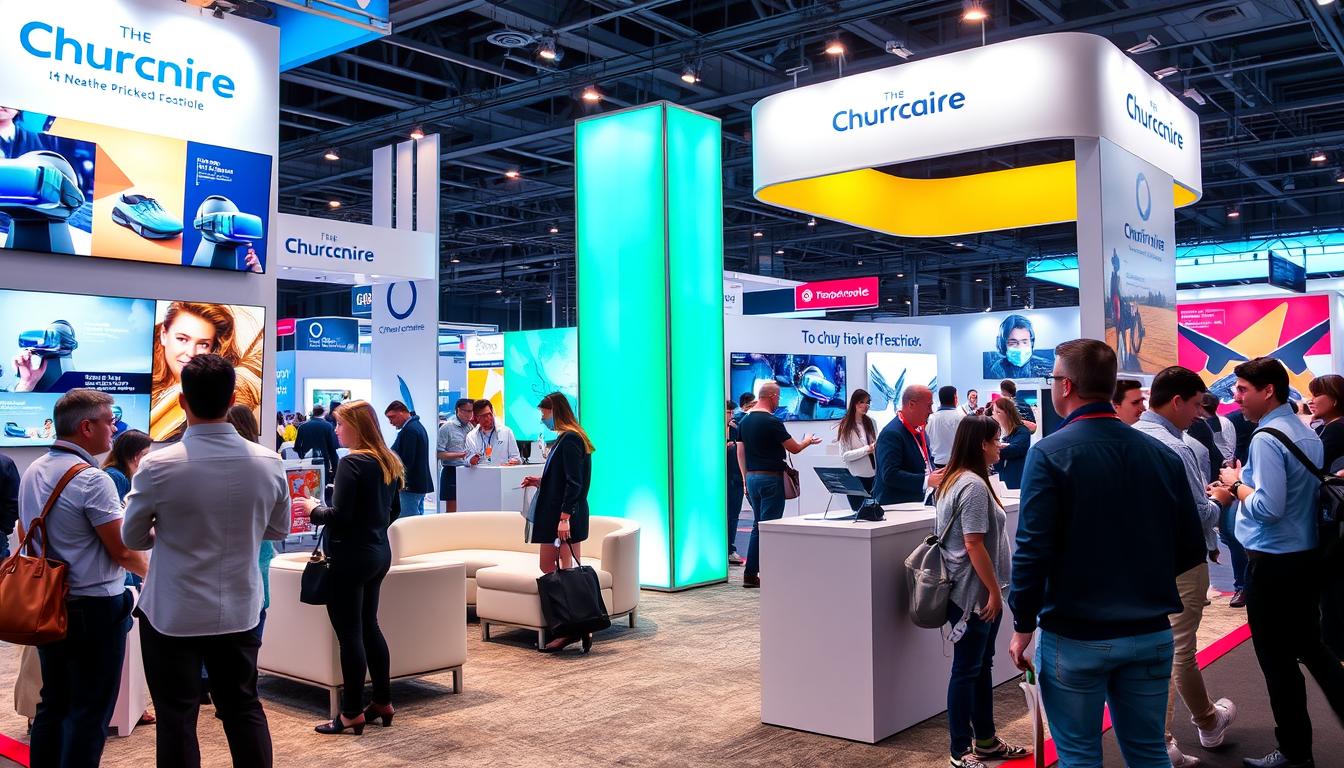Trade shows buzz with energy, but standing out in the crowd is tough. Enter branded games – the secret weapon in event marketing. These interactive experiences transform passive visitors into engaged leads. By tapping into gamification, you’ll turn your booth into a magnet for potential clients.
Gone are the days of static displays and lackluster handouts. Today’s lead generation demands creativity. Branded games offer a fresh approach, blending fun with business in a way that resonates with attendees. They create memorable moments that stick long after the event ends.
Smart companies are leveraging these interactive experiences to boost their presence on the show floor. By engaging visitors in playful yet purposeful activities, they’re not just collecting business cards – they’re starting conversations and building relationships. It’s a win-win: attendees have fun, and you gather valuable leads.
Key Takeaways
- Branded games boost engagement at trade show booths
- Interactive experiences lead to better lead generation
- Gamification creates memorable brand interactions
- Event marketing thrives on creative engagement strategies
- Games transform passive visitors into active participants
Understanding the Power of Interactive Booth Experiences
Trade shows are evolving, and interactive booth experiences are leading the charge. These dynamic setups captivate attendees, boosting brand engagement and visitor conversion rates. Let’s dive into why these experiences are game-changers for businesses.
The Psychology Behind Gamified Engagement
Gamification taps into our innate desire for competition and reward. By incorporating challenges and prizes, booths create a memorable experience that keeps visitors engaged longer. This increased dwell time allows for deeper connections and more opportunities for lead generation.
Why Traditional Booth Methods Fall Short
Static displays and passive presentations often fail to grab attention in today’s fast-paced trade show environment. Attendees crave interaction and personalization, which traditional methods struggle to provide. Interactive experiences offer a refreshing change, making your booth a must-visit destination.
The Rise of Experiential Marketing at Trade Shows
Experiential marketing is revolutionizing trade shows. By creating immersive brand experiences, companies can forge emotional connections with potential clients. These memorable interactions lead to increased brand loyalty and higher conversion rates. As more businesses adopt this approach, those sticking to outdated methods risk being left behind.
| Traditional Methods | Interactive Experiences |
|---|---|
| Passive information delivery | Active participation |
| Limited engagement time | Extended visitor dwell time |
| One-size-fits-all approach | Personalized interactions |
By embracing interactive booth experiences, businesses can create lasting impressions that translate into tangible results. The key lies in understanding your audience and crafting experiences that resonate with their interests and needs.
How to Convert Booth Visitors into Leads with Branded Games
Branded games are a powerful tool in your trade show strategy arsenal. They can boost booth traffic and create memorable interactive experiences for visitors. By implementing the right game, you’ll turn casual passersby into engaged leads.
Selecting the perfect game is crucial. Choose one that aligns with your brand message and captivates your target audience. A well-designed game can increase sales by guiding visitors through a fun, engaging experience that naturally leads to lead capture.
Integrate your game seamlessly into your booth design. Place it strategically to draw attention and create a natural flow of traffic. This encourages more interactions and keeps visitors in your space longer.
“Games at trade shows aren’t just for fun. They’re a strategic tool to engage visitors and capture valuable leads.”
To maximize lead generation, align your game with specific goals. Use it to collect contact information, gauge interest in products, or educate visitors about your offerings. Make sure the game mechanics support these objectives while providing an entertaining experience.
| Game Type | Lead Generation Goal | Visitor Engagement Level |
|---|---|---|
| Quiz | Educate about products | Medium |
| Virtual Reality | Showcase services | High |
| Spin-to-Win | Collect contact info | Low |
Remember, the key to success is balance. Your game should be fun enough to attract visitors but focused enough to generate quality leads. With the right approach, branded games can transform your booth into a lead-generating powerhouse.
Designing an Irresistible Booth Layout for Maximum Engagement
Creating a captivating booth layout is crucial for driving booth traffic and enhancing visitor conversion. A well-designed space can transform your trade show presence into a magnet for potential clients.
Strategic Placement of Interactive Elements
Position interactive experiences strategically to draw visitors in. Place eye-catching displays near the entrance and use digital marketing tactics to guide attendees through your booth. This approach creates a natural flow, encouraging exploration and engagement.
Creating Flow and Movement Patterns
Design your booth with clear pathways that lead visitors through key areas. Use signage and lighting to highlight different zones. This thoughtful layout maximizes booth traffic and ensures visitors experience all your offerings.
Incorporating Technology Touchpoints
Integrate technology throughout your booth to enhance interactive experiences. Touch screens, VR demos, and digital product showcases can significantly boost visitor conversion rates. These tech elements not only inform but also entertain, making your booth memorable.
| Booth Element | Purpose | Impact on Engagement |
|---|---|---|
| Interactive Displays | Product Demonstration | High |
| Digital Signage | Information Delivery | Medium |
| VR Experiences | Immersive Engagement | Very High |
By combining these elements, you create a booth that not only attracts visitors but also keeps them engaged, significantly increasing your chances of successful lead generation and conversion.
Essential Elements of Successful Trade Show Games
Trade show games have become a powerful tool for brand engagement and lead generation. By incorporating gamification elements, companies can create memorable experiences that captivate booth visitors and drive conversions.

- Engaging Mechanics: Design games that are easy to understand yet challenging enough to hold interest.
- Branded Integration: Seamlessly incorporate your company’s branding and messaging into the game.
- Reward Systems: Offer prizes or incentives that motivate participation and reinforce your brand value.
- Data Collection: Implement smart lead capture methods that gather valuable visitor information.
When crafting your game strategy, consider the following table of game types and their benefits:
| Game Type | Engagement Level | Lead Quality | Data Collection |
|---|---|---|---|
| Quiz Games | High | Medium | Excellent |
| Virtual Reality | Very High | High | Good |
| Spin-to-Win | Medium | Low | Fair |
| Scavenger Hunts | High | High | Very Good |
By focusing on these elements, you can create games that not only attract visitors but also generate quality leads. Remember, the goal is to create effective strategies that blend entertainment with purposeful marketing objectives.
“The best trade show games are those that visitors can’t resist playing and brands can’t wait to measure.”
With careful planning and execution, your trade show games can become powerful tools for brand engagement and lead generation, setting your booth apart from the competition.
Implementing Digital Lead Capture Systems
Digital lead capture systems revolutionize event marketing and boost visitor conversion. These tools seamlessly collect data, integrate with CRM systems, and provide real-time lead scoring. By leveraging technology, businesses can enhance their lead generation efforts at trade shows and events.
Seamless Data Collection Methods
Modern lead capture methods simplify data gathering. QR codes, RFID badges, and mobile apps streamline the process. Attendees can quickly share contact info, interests, and preferences with a simple scan or tap. This frictionless approach increases participation and data accuracy.
Integration with CRM Systems
Effective lead capture systems sync with CRM platforms. This integration enables immediate follow-up and personalized marketing. Sales teams can access lead information in real-time, allowing for quick, targeted responses. The result? Higher conversion rates and improved ROI from trade show investments.
Real-time Lead Scoring and Qualification
Advanced lead capture tools offer instant lead scoring. They analyze attendee behavior, engagement levels, and provided information. This real-time qualification helps prioritize high-value prospects. Sales teams can focus their efforts on the most promising leads, maximizing efficiency and conversion potential.
| Lead Capture Method | Data Collection | CRM Integration | Lead Scoring |
|---|---|---|---|
| QR Codes | Fast | Instant | Basic |
| RFID Badges | Automatic | Real-time | Advanced |
| Mobile Apps | Interactive | Seamless | Comprehensive |
Training Your Booth Staff for Game-Based Interactions
Effective booth staff training is crucial for a successful trade show strategy. By equipping your team with the right skills, you can boost visitor conversion and manage booth traffic efficiently. Let’s explore key aspects of training your staff for game-based interactions.
Role-Playing Scenarios and Best Practices
Role-playing helps staff prepare for various situations they might encounter. Practice scenarios like:
- Introducing the game to hesitant visitors
- Explaining rules quickly during busy periods
- Transitioning from game play to business discussions

Converting Game Participants into Qualified Leads
Teach your staff to seamlessly move from game engagement to lead qualification. Encourage them to:
- Ask open-ended questions about the visitor’s business needs
- Highlight how your products solve specific challenges
- Collect contact information for follow-ups
Managing High-Traffic Periods
During peak times, efficient booth management is essential. Train your team to:
- Rotate roles to prevent burnout
- Use digital tools for quick lead capture
- Keep game sessions brief to accommodate more visitors
Remember, the key to successful visitor conversion lies in understanding your audience’s needs and providing value. By implementing these training strategies, your booth staff will be well-equipped to maximize engagement and generate quality leads at your next trade show.
| Training Focus | Key Skills | Expected Outcome |
|---|---|---|
| Game Introduction | Clear communication, enthusiasm | Higher participation rates |
| Lead Qualification | Active listening, needs assessment | Increased qualified leads |
| Traffic Management | Multitasking, adaptability | Improved booth efficiency |
Measuring ROI from Gaming Activities
Tracking the success of your trade show strategy is crucial for lead generation and event marketing. Measuring the return on investment (ROI) from gaming activities helps refine your approach and maximize results.
- Number of game participants
- Leads collected
- Conversion rate from participants to leads
- Quality of leads generated
- Post-event engagement rates
Use digital tools to streamline data collection and analysis. Many lead generation platforms offer integration with CRM systems, making it easier to track long-term results.
Compare your gaming ROI to other lead generation methods:
| Method | Average Cost per Lead | Lead Quality Score | Conversion Rate |
|---|---|---|---|
| Gaming Activities | $15 | 8.5/10 | 35% |
| Traditional Booth | $25 | 6/10 | 20% |
| Digital Ads | $30 | 7/10 | 25% |
Use this data to refine your trade show strategy. Adjust game mechanics, booth layout, and staff training based on performance metrics to boost your ROI in future events.
Conclusion
Branded games are game-changers in event marketing. They’re not just fun; they’re powerful tools for lead generation. By creating interactive booth experiences, you can transform casual visitors into valuable leads. This approach taps into the psychology of engagement, making your booth a must-visit destination at trade shows.
Remember, success lies in the details. A well-designed booth layout, strategic placement of interactive elements, and seamless digital lead capture systems are key. Don’t forget to train your staff to handle game-based interactions effectively. These strategies work together to maximize your event marketing efforts and boost your ROI.
As you plan your next trade show appearance, consider how to convert booth visitors into leads with branded games. This innovative approach can set you apart from the crowd and drive significant results. By implementing these tactics, you’re not just participating in a trade show; you’re creating memorable experiences that translate into tangible business opportunities.
FAQ
How do branded games help convert booth visitors into leads?
Branded games help convert booth visitors into leads by creating an interactive and engaging experience. They capture attention, encourage participation, and provide a fun way to collect visitor information. Games also increase dwell time at your booth, giving staff more opportunities to interact with potential leads and showcase your products or services.
What types of games work best for trade show booths?
The best games for trade show booths are those that are quick to play, easy to understand, and align with your brand message. Popular options include digital quizzes, touchscreen challenges, virtual reality experiences, and customized mobile games. The key is to choose games that attract attention, reflect your brand personality, and facilitate data collection.
How can I measure the success of my branded game in lead generation?
To measure the success of your branded game in lead generation, track metrics such as number of game participants, leads collected, conversion rates, and post-event follow-ups. Use digital lead capture systems integrated with your CRM to monitor real-time data. Compare these metrics with your overall booth traffic and previous trade show performances to gauge improvement.
How do I train my booth staff to effectively use games for lead conversion?
Train your booth staff by conducting role-playing scenarios that simulate game interactions. Teach them how to smoothly transition from game play to meaningful conversations about your products or services. Provide scripts for qualifying leads and handling objections. Also, ensure they’re familiar with the game mechanics and can troubleshoot any technical issues.
Can branded games work for B2B companies at trade shows?
Absolutely! Branded games can be highly effective for B2B companies at trade shows. The key is to design games that are relevant to your industry and target audience. For example, you could create a simulation game that demonstrates your product’s benefits or a quiz that tests industry knowledge. These games can spark conversations and showcase your expertise in a memorable way.
How do I design my booth layout to maximize game engagement?
To maximize game engagement, design your booth layout with strategic flow patterns. Place your game stations in visible areas that don’t obstruct traffic. Create clear signage and use eye-catching graphics to draw attention. Ensure there’s enough space for people to play comfortably and for others to observe. Consider using digital displays to showcase game leaderboards and attract more participants.
What’s the best way to collect lead information through games without being intrusive?
To collect lead information through games without being intrusive, use a tiered approach. Start by asking for minimal information (like name and email) to play the game. Offer incentives or enhanced game features for providing additional details. Use digital forms that are quick and easy to fill out. Always be transparent about how you’ll use the information and provide clear opt-in choices for future communications.
How can I ensure my branded game aligns with my overall marketing strategy?
To align your branded game with your overall marketing strategy, ensure it reflects your brand message and values. Incorporate your brand colors, logos, and key messaging into the game design. Create game scenarios or questions that highlight your products’ benefits or industry expertise. Set game objectives that match your marketing goals, whether it’s lead generation, product education, or brand awareness.


